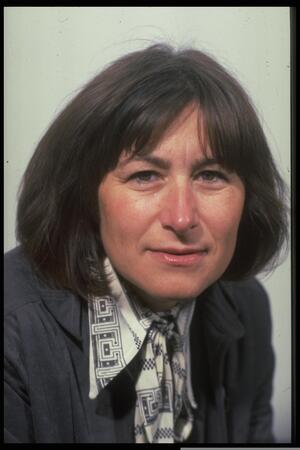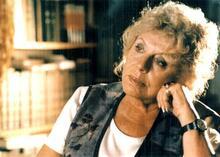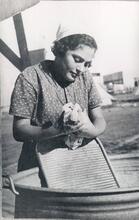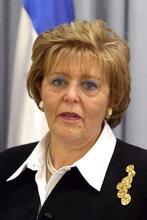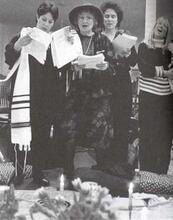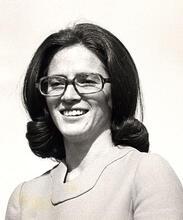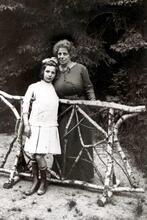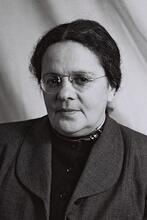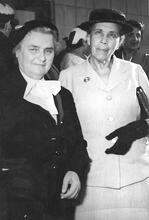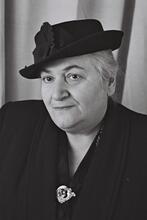Yehudit Karp
After finishing her law studies in 1961, Yehudit Karp held many positions, including head of the Department of Criminal and Public Law Legislation at the Ministry of Justice and deputy attorney general of Israel. Her commitment to the strengthening of human rights in Israel led her to be a pioneer in diligently preserving moral standards, especially among victims, women, and children. Throughout her career at the Ministry of Justice, Karp was involved in the development of Israel’s Basic Law (essentially its constitution) and charter of rights. Later in her career, she became involved in the United Nations, making a global impact in the areas of crime prevention and juvenile justice. Karp is also the author of many publications in various fields, both in Hebrew and English.
Background and Education
Yehudit Karp is widely acknowledged for her determined pursuit of truth and justice. Throughout her career as a lawyer she has acted with grit in the Israeli and international spheres, to preserve moral standards and to ensure human rights in general and women’s, children’s, and victim’s rights in particular. She has received awards from the Israeli Bar Association for her special contribution to the advancement of the status of women in Israel and from the National Council for the Child for her contribution to the status and welfare of children in Israel.
Karp was born in Jerusalem on October 28, 1937, to Hungarian-born civil engineer Moshe Pelley (1893–1960), who immigrated to Palestine in 1921, and his wife Hannah (1904–1975), who was born in Yugoslavia and immigrated to Palestine in 1929. Yehudit’s brother Itamar (PhD in chemistry, a professor in the Department of Geological and Environmental Sciences at Ben Gurion University of the Negev) was born in 1936. Yehudit is married to graphic artist Nathan Karp (b. 1934), who emigrated from Russia to Israel in 1950 and is the designer, among other items, of many of Israel’s official coins and medals. They have two children: a daughter, Lee (b. 1964), who is a marine biologist (PhD), and a son, Haggai (b. 1966), a member of A voluntary collective community, mainly agricultural, in which there is no private wealth and which is responsible for all the needs of its members and their families.Kibbutz Rosh ha-Nikrah and an industrial designer.
Legal Career
After graduating from Ma’aleh Religious High School in Jerusalem in 1955, Karp served in the Israel Air Force Intelligence for two years and in 1957 began her law studies at the Hebrew University of Jerusalem, where she eventually completed her studies summa cum laude in 1961. She then began clerking for Justice Shimon Agranat (1906–1992), who was at the time the vice president of the Supreme Court; after one year there, she moved to the Department of the High Court of Justice in the Ministry of Justice, where she worked with Tzvi Terlo (later a judge in the National Labor Court) and under the wing of Mishael Cheshin (later a Supreme Court Justice). She remained at the ministry until her retirement in 2002. During the period of her clerkship, the appeal of Adolf Eichmann was in process. Justice Agranat was on the panel of judges who heard the appeal ,and Karp found herself, as the judge’s clerk, sitting opposite the glass “cage” in which the accused was seated. She later recounted that she conducted a “battle of the eyes” with Eichmann, in which she triumphed every time she forced him to look down. While clerking she also became a teaching assistant in Constitutional and Administrative Law to Professor Hans Klinghoffer and Professor Benjamin Akzin (1904–1985) at the Hebrew University of Jerusalem.
In 1963 Karp began a nine-year stint as personal assistant to the Attorney General of Israel, a position successively occupied during this period by Meir Shamgar and Aharon Barak, later both Presidents of the Supreme Court. In 1972 she was appointed head of the Department of Criminal and Public Law Legislation at the Ministry of Justice, a position she held for six years, during which she was the guiding force behind a long series of new laws designed to bring mandatory law into line with Israeli norms and to develop new Israeli legislative reforms in various fields. In 1978 Karp was appointed as the deputy attorney general of Israel and served in this position under many of the attorney generals of Israel, starting with Yitzhak Zamir (later judge of the Supreme Court), until her retirement in 2002.
At the beginning of the 1980s a group of lecturers in the law schools of the Hebrew University and Tel Aviv University published a letter in which they raised the problem of “private policing” by the Israeli settlers in the occupied territories and the lack of legal action against the culprits. When their complaint reached the High Court of Justice, an official committee of enquiry was appointed by the Attorney General, with Karp at its head. After a year of investigation, which included scrutiny of police response to the law infringers in Judea and Samaria, the committee submitted a sharp and uncompromising report, not only demanding a radical change in police action and law enforcement, but also warning government functionaries of the imminent dangers to the rule of law the committee had uncovered. When the committee’s findings failed to arouse any official response, Karp resigned in protest from her position as head of the committee of inquiry.
Other controversial issues marked her term as deputy attorney general. In the mid-1980s she found herself in the eye of the storm when she supported Attorney General Yitzhak Zamir in his obstinate pursuit of the truth behind the death of two terrorists, which led him to accuse the head of the security services and other senior officers of the service of being responsible for both the killing and the falsification of evidence to cover the act. Personal insults, chauvinistic comments, and harsh criticism deterred neither Karp, nor Edna Arbel, then the public prosecutor in the Central Region and the head of a special committee from looking into the police file, nor Yitzchak Eliassof, the senior supervisor of legislation and advisor to the Minister of Justice, from compiling a profoundly critical report on the behavior of the senior security service officers. In this instance, too, obdurate determination to expose the truth and commitment to the rule of law marked Karp’s bold and unhesitating condemnation of official action. However, she was unsuccessful in her almost lone attempt to clear the names of those security service officers who helped the Attorney General expose the web of lies.
During her years in the Ministry of Justice, Karp sometimes found herself at odds with the state prosecutors, for instance when she fought for the opening of new trials in two notorious murder cases, that of young Daniel Katz and that of Rachel Heller, a woman soldier. In both cases, the convicted men served long prison sentences; in both cases the Supreme Court granted a new trial, against the strong opposition of the Attorney General and the State Attorney. In the Heller case, the accused, Amos Barnes, was finally acquitted, but the sentences of the Israeli Arabs accused of murdering Katz were finally upheld.
Impact
Karp is the author of a report on the “Policy of Investigation and Prosecution in Domestic Violence Cases,” based on the recommendations of a committee on this subject which she headed (1989). The report, which was a turning point for reform in the work of the police, the prosecution, the courts, and the welfare system in this field, also constituted the basis for a change of public attitudes in Israel regarding the seriousness of this phenomenon and the need to combat it.
Karp’s involvement in her fields of responsibility led to extensive reforms of legislation and policies in various fields of criminal law and the criminal justice system, police work, law enforcement, the juvenile justice system, prisons, modes of punishment, criminal records, domestic violence, sex offences, trafficking in persons, commercial sexual exploitation of children, money laundering, and drug and alcohol abuse. She was also active in the process of establishing the Public Defender Institution in Israel. The common denominator of all these fields was that, so far as she was concerned, all of them were indicative of social and legal structures and policies that were concerned with issues of human rights and with the need to find the right balance between public interests and the interests of the individual, so as to create the appropriate infrastructure for a just and better society.
Throughout her career in the Ministry of Justice Karp was involved in the development of Israel’s constitution and charter of rights. She was an active partner in the drafting of most of the basic laws of Israel that form Israel’s “constitution” and advocated as a representative of the ministry during the Lit. "assembly." The 120-member parliament of the State of Israel.Knesset debates on these laws. Basic Law: Human Dignity and Liberty, which is considered to be the charter of rights in Israel, was essentially formed according to a draft personally initiated by Karp along the lines of the Canadian Charter of Rights. Karp was also the catalyst in the Ministry of Justice for Israel to adhere to some of the UN human rights conventions.
Her commitment to the strengthening of human rights in Israel led her to be a pioneer in diligently pursuing the recognition and enhancement of the rights of victims of crime via legislation, treatment, and rehabilitation services, as well as state compensation.
Karp was a member of the Israeli negotiation team on the normalization of relations with Egypt after the peace accord of 1978.
In 1990 Karp headed the Israeli delegation to the UN Congress on Crime Prevention and the Treatment of Offenders held in Havana, Cuba. Her activity in the spheres of the UN has led to Karp’s participation in numerous international conferences and expert committees designed to advance children’s rights, and also in UN and other international expert committees to further the rights of victims of crime and abuse of power including participation in the UN expert drafting committees of the Handbook on Justice for Victims, the UN Guide for Policy Makers on the Implementation of the UN Declaration on Basic Principles of Justice for Victims of Crime and Abuse of Power, the UN handbook on Domestic Violence and in the IBCR drafting committee on Justice for Child Victims and Witnesses of Crime.
From 1995 to 2003 Karp was a member of the UN Committee on the Rights of the Child, serving for two years as its vice chairperson and for an additional two years as the committee’s rapporteur. From 1998 to 2003 she was also a member of the UN’s International Panel for Coordination of Technical Advice and Assistance in Juvenile Justice. She was also an active participant in the global movement to eliminate corporal punishment against children. Asked whether these unending efforts will ultimately lead to the desired goal, she replied, “If someone were to come and tell me that it was like scratching the barrier walls, I wouldn’t argue with them. But if we scratch long enough, and strong enough, perhaps the wall will fall at last.”
Karp is the author of many publications in various fields, both in Hebrew and English, and of an educational program for school children titled “Legal and Social Literacy.”

